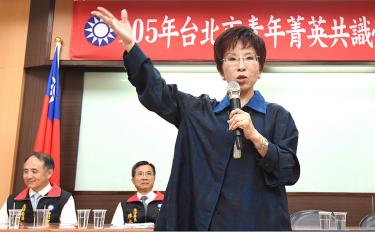Have no fear of ‘unification’: Hung
By Shih Hsiao-kuang and Alison Hsiao / Staff Reporters
Chinese Nationalist Party (KMT) Chairwoman Hung Hsiu-chu (洪秀柱) said at a “consensus camp” held by the party for young people yesterday in Taipei that critics did not properly understand the so-called “1992 consensus,” and that terms such as “unification” should not spark fear.
She also defined the China-Taiwan relationship as being “between two regions,” saying that as the Republic of China (ROC) Constitution still exists and the Act Governing Relations Between the People of the Taiwan Area and the Mainland Area (臺灣地區與大陸地區人民關係條例) has not been abolished, the cross-strait relationship is one between two regions.
Before people criticize the “1992 consensus,” they should first have a good understanding of the historical background of this term and give it an unbiased evaluation, she said.
The “1992 consensus” — a term former Mainland Affairs Council chairman Su Chi (蘇起) admitted making up in 2000 — refers to a tacit understanding between the Chinese Nationalist Party (KMT) and the Chinese government that both sides acknowledge there is “one China,” with each side having its own interpretation of what “China” means.
Hung said that the nation’s identity is in crisis and many Taiwanese fear talk of “unification” or any mention of “zhong guo “(China,中國).
“We cannot unify others but are afraid of being unified by the Chinese Communist Party,” she said. “Taiwan simply does not have the needed materials to obtain independence, because that would mean waging a war. Do people really have the guts to throw their heads away and spill hot blood to establish a Taiwan republic?”
She said the KMT is endeavoring to help Taiwan find a way out, as there is no guarantee for how long Taiwan can maintain the “status quo,” but lamented that the KMT in doing so has often been labeled “red.”
“However, I’m not afraid of being labeled. Because politicians need to speak truthfully, rather than talk nonsense for the votes,” she said, adding that people would not support the KMT if it simply copies the Democratic Progressive Party (DPP).
Hung said that people have forgotten that the KMT kept Taiwan safe and helped it to develop and prosper after it came to Taiwan, and remember only the 228 Incident and the White Terror era.
“Has the KMT done nothing else?” she said, adding that learning from history is the way to prevent repeating it.
“It is tragic for Taiwan that some politicians always pour salt into the wound and manufacture hatred, opposition and polarization,” she said.
Hung also commented on the recent change of rules made by Academia Historica on reading files stored in the institution that would restrict people from China, Hong Kong and Macao from accessing the files, which the institution said is “returning to what the law demands.”
“The DPP in the name of transitional justice wants the KMT to open its files concerning the party’s history to the public, but at the same time discriminates against people from certain regions when it comes to accessing the nation’s history, which is a move that is clearly of questionable intent and inappropriate,” she said.

No comments:
Post a Comment